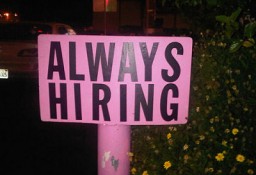The fall hiring season is upon us, and I’m spending a good deal of time each day coaching clients on a few basic principles to increase their chances of getting hired sooner rather than later.
As a job searcher, it is essential to understand the nature of your relationship with a hiring manager, whether you are meeting him or her in a formal job interview or speaking to them informally in their office, at a conference, at a networking event, or any other venue.
1. The most important person in the hiring process
Unless you start your own business and hire yourself, you will always be dependent on someone else to hire you. That person is the most important person in the hiring process. We call that person a “hiring manager,” not because they spend all their time hiring—far from it!—but because they have the power to hire you. The person you report to in any organization is your hiring manager.
2. Hiring managers are human beings too
When you go looking for a job, you are preoccupied, naturally and rightfully, with your own needs and priorities– you want a solid ROI on all that education and experience you’ve already invested in your career. You want a job that is fun, or lucrative, or easy, or challenging, or close to home, or any combination thereof.
In the same way, a hiring manager is interested, first and foremost, in protecting and promoting their own career. And, s/he is not going to make a decision or take an action that might jeopardize their career. Remember, too, that in many cases, managers are not trained to hire (they are trained to manage plans, priorities, programs, projects, budgets, schedules, and so on), or they don’t enjoy hiring, or they are not very good at it. As human beings, they are looking for an easier way to do things, including hiring.
3. Hiring is a risk assessment exercise
Put yourself in their shoes: they don’t know you. It is human nature to fear what we don’t know. To increase your chances of getting hired, it is important to understand the hiring process from their pov. And, from their pov, the hiring process is a risk assessment exercise.
There is a lot of truth to the old cliche that ‘people hire who they know.’ Managers know that nobody is perfect; everyone has shortcomings, weaknesses, faults, biases, and prejudices–-things that pose a potential threat to the safety of his or her career. Everyone has a downside. It is easier to hire somebody you know because it is easier to assess their downside : “I know Bob, Janet and Ricardo, each has strengths and weaknesses, but when I look at their shortcomings, can I still manage them? Are they a threat to my career?”
Think about formal interviews, and how many questions are designed to uncover weaknesses and shortcomings: What is your greatest weakness? Describe a situation in which you were unsuccessful achieving a goal, and how did you respond? How would you rate your ability to resolve conflict on a scale of 1 to 10, from low to high, then give me an example?
Sure, managers want employees who are competent in terms of knowledge and skills but those employees aren’t much good to them unless they can manage them easily. Above all, a hiring decision for a manager is about feeling “safe” with them, safe in terms of protecting and promoting their own career as a manager.
4. “Why should I hire you?”
Every job search campaign is a response to this simple question. It’s one that may be simple to ask, but it’s difficult to answer, especially when you focus your answer on the “you” part of the question. Your first inclination is to start your sales pitch, to convince a manager that you are a good choice. You want to highlight your features and benefits, such as “I’m reliable, dependable and hard-working.”
But, the truth is, you will do better in any interview when your focus on this question is on the “why” not the “you.”
5. Tapping into pain points
I realize that this approach is counter-intuitive. In fact, I ask my clients to write down the phrase, “It’s not about me!”…to remind them of this fundamental principle, since our inclination is almost always to focus on our needs and priorities first; or, our lack of experience, education, or credentials; or, our accomplishments. These things may be relevant to a successful job search but they should not the primary element of your job search strategy.
Let’s step back for a moment and consider the priorities of a hiring manager again. Managers are not focused on you when they are thinking of hiring. They are thinking about their needs and priorities. Managers are responsible for achieving the goals and objectives of their organizations…that’s why they get paid big bucks, have fancy job titles, and get perks. However, it is not easy to attain those goals. If it was easy, they could do all the work themselves and wouldn’t need employees!
But the nature of reality is adversity : things get in the way of corporate goals and objectives, such as problems, challenges, issues and pressures. To a sales professional, these “things” are known as “pain points.”
In sales, it is important to understand the goals of your prospects and their pain points in order to determine how your product or service can make their pain go away and reach their goals. The only difference between sales and job search is that you are the product or service for pain relief!
This is the agenda behind every hiring decision, i.e. the manager is looking for help around specific pain points. Your job in a formal or informal interview is to uncover that agenda. Once you are in the door, it is important to get a hiring manager talking. Listen for clues to their pain points. Respond not with the features of your value proposition (i.e. your education, experience, personal traits) but with benefits (i.e. how you can help them with their pain points).
Obviously, we cannot cover here every possible scenario. I am outlining a strategic approach. The implementation of this strategy is up to you. That is why I strongly suggest that job searchers get professional help. There is a lot at stake in terms of your career. You want to optimize your time and energy.
Summary
Establish rapport with a manager by focusing on their needs and priorities. What is their agenda? What challenges, issues, problems, pressure points are driving this hiring decision? Flush out concerns. Find out what red flags the employer may have about hiring somebody they don’t know. Listen carefully for “sensitive” questions.
Many times informal interactions with a hiring manager can turn into formal interviews because a manager has a genuine need to hire. They warm up to you as the person asking the questions, and they want to make the most out of their time with you.
The truth is this : there are always jobs and managers are always hiring. Be prepared!








